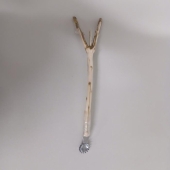




Denise Cares wrote:I agree with what Kate Muller has said about reasons for having supply on hand. My problem is how to prevent those pesky grain larvae from getting into everything. Even buckets with tight lids do not keep them out. They get into glass jars too. I'm missing the secret. Maybe need to remove the oxygen as many describe. Putting the whole bag of grain thru the freezer before sealing in a bucket would be difficult as freezer space is very limited. So even dividing up the 25 lb sacks would pose a major logistics issue. Multiply that by several large sacks - not feasible. Once a single moth finds "where you keep the goods" (pantry, shed, garage, closet), it's nearly impossible to keep them out thereafter.

junaid ahmed wrote:It seems like the grain storage problem has already been handled by the local grain elevator, and doesn't really benefit by home storage methods. Flour also seems like a problem that is best solved by the mill. Is there a reason why you want to store more than a month worth of dry grain or flour? Am I missing part of the goal? Or is experimenting with different preservation techniques the goal?

Pearl Sutton wrote:....when thrift store shopping is fun because the employees either ask "what IS that thing? We wondered!" or say "Oh neat, you know what that is! We were wondering if anyone would know and buy it!"
And the other half of it, when you can text permie friends pictures of odd stuff at the thrift store, and they reply "Yes please! All of them!!" or "ooooooh! YES!!!"


Pearl Sutton wrote:When, due to health stuff, the garden is not planted yet, some of the beds were not even cleared last fall, none were done the way I want beds done in the fall to be ready for spring, so everything needs work before I can even find the dirt under the weeds to amend and plant it.
BUT!!
The main weeds out there are brown eyed susan, ox eye daisy, buttercups, yarrow, lots of asters as tall as I am...
You know you are a permie when you say "I'm not coping, but at least the bees are happy!"

